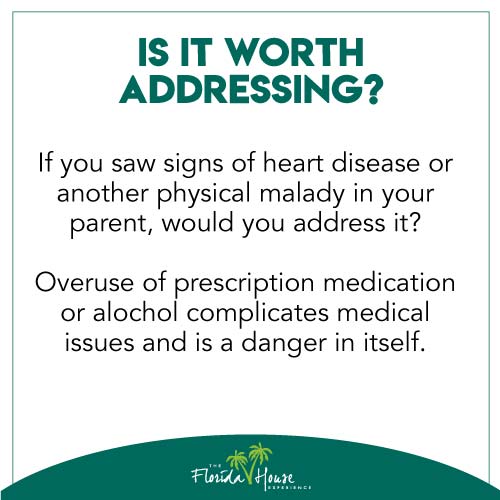
Alcohol and drug abuse is not something that just happens to people in their teens and 20s; it impacts many people through all walks of life. Children are increasingly facing their parent’s substance abuse.
A middle-aged man has surgery to repair a knee injury. A year later, he’s facing addiction to painkillers. A mother in a high-stress job starts using alcohol as a way to numb her frustrations and regrets. Even seniors can struggle with drug abuse due to medication dependency. This is evident in the number of children in the U.S. foster care system. According to the U.S. Department of Health and Human Services, there were 437,500 children in foster care in 2016, up from 397,000 in 2012. Much of this increase is due to parental drug abuse.
Are you concerned about your parents using or abusing drugs? No matter if you are a teenager trying to help your parent or you’re worried about your parent later in life, it can be overwhelming and frustrating to know what to do. At FHE Health, we work with people who need help now. We can provide support for interventions and offer guidance to help you take the next step for your loved one.
Should You Speak to Your Parent About Their Drug Use?
 For some adult children, it can be hard to break that line and speak to their parents about their actions. You respect your parents. You value them. Yet, if they have a substance use disorder, they may not be able to simply stop using on their own or may not recognize the extent to which addiction is occurring.
For some adult children, it can be hard to break that line and speak to their parents about their actions. You respect your parents. You value them. Yet, if they have a substance use disorder, they may not be able to simply stop using on their own or may not recognize the extent to which addiction is occurring.
It’s not uncommon for those who use drugs or alcohol to recognize they have an addiction. If you think this is the case with your parents, it may be up to you to take action. If you don’t, how will your loved one get the help they need? Alcohol and drug abuse is a life-threatening health condition. Addiction and dependency need to be viewed as any other health condition. If your loved one was depressed or suffering from heart disease, would you speak up to get help? Chances are good you would, and you should now.
Signs a Parent Is Facing a Substance Use Disorder
The signs of a person using drugs may not be as hard to spot as you think. Even if you don’t see your parents every day, you may be able to spot the common signs of drug abuse or alcoholism. They include the following, according to the U.S. National Institute on Drug Abuse:
- They have new friends and may not spend much time with other people in their life who used to be important to them.
- They lose interest in their favorite things.
- They spend a lot of time on their own.
- They tend to be in a bad mood. You feel like you’re bothering them when you visit.
- They are tired, sad and seemingly depressed.
- Their sleep schedule is not normal or has changed significantly from before.
- They have a lot of energy and seem to talk fast or don’t always make sense when speaking to you.
- They miss important events or are struggling to maintain responsibilities at home, at work, at school or within the family.
- Their appearance has changed. They don’t practice good hygiene.
- They have spells of passing out and may not remember some time frames.
If you suspect your loved one may be using drugs or alcohol, now is the time to take a step towards helping them. How do you confront a person using drugs or alcohol?
How to Approach Your Loved One
 Expect someone with a drug or alcohol addiction to be in denial. Recognize that they cannot simply stop using (at the addiction level, their body is physically dependent on the drug). Then, consider that they probably don’t want to live like this but are unsure or unable to make a change that could benefit them in the long term.
Expect someone with a drug or alcohol addiction to be in denial. Recognize that they cannot simply stop using (at the addiction level, their body is physically dependent on the drug). Then, consider that they probably don’t want to live like this but are unsure or unable to make a change that could benefit them in the long term.
Remain Calm and Express True Concern
Approach your loved one when there’s time to talk openly. Remain calm and level-headed, no matter what they say or how they react. You don’t want to vent anger or frustration to start with when confronting a loved one. Rather, you want to learn about what’s happening. Don’t let yourself be brought into an argument, as that may be their way of defusing the situation and getting out of it.
Don’t Express Disappointment or Assume You Know What They’re Facing
Most parents using drugs or alcohol do so for a reason. You may not have any idea what they are facing or what type of traumatic event occurred to put them in this place. Listen; don’t assume. You also don’t want to tell them you’re disappointed or ashamed. Rather, you want them to see you’re concerned and that you want to help.
Talk About What the Addiction Makes You Feel Like, Too
It’s important to show your loved one that their addictive behavior is impacting you. You are scared, worried and even frustrated. You may be feeling as though you’re losing someone who’s very important to you. Provide specific examples of times when you were worried and talk about how that impacted you. You want to be sure you show how their actions impacted your feelings.
Have a Plan for them to Move Forward With
Having a conversation is very important, but there’s more to be done. When your parent looks at you and says, “What can I do? I can’t just stop,” you need to have an answer. This is why it helps to have spoken with a treatment center in advance and have a plan for them. Talk about their options. Make it seem like it’s possible and even easy for them to get help. Speak about how you can help your loved one to make this transition, perhaps alleviating their worries about their spouse or other responsibilities. Show them they can get help and that you’re there to support them through the process.
Finding Help for Drug Abuse at FHE Health
If you need help caring for your loved one or you need intervention services, contact FHE Health. Our team works closely with you to help you find the care and support you need. As a full-service drug and alcohol treatment center, we can help you start the conversation and help your loved one to get the recovery help he or she needs. Contact us today.






